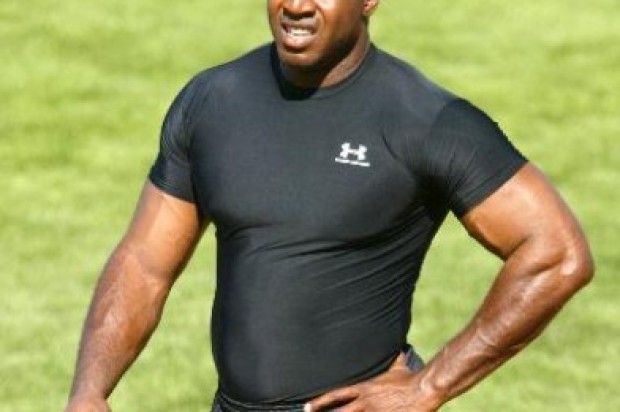
Several members of an 11-judge federal appeals court panel appeared dubious of home-run champion Barry Bonds’ obstruction-of-justice conviction during a hearing in San Francisco today.
Bonds, 50, is appealing his 2011 conviction in federal court in San Francisco for obstructing justice by giving misleading or evasive testimony to a U.S. grand jury in 2003.
The grand jury was investigating the sale of steroids and other performance-enhancing drugs to professional athletes by the Burlingame-based Bay Area Laboratory Co-Operative, or BALCO.
The former San Francisco Giants slugger has served his sentence of one month of home confinement, but he and his team of six lawyers are continuing his appeal in a bid to clear his name.
Bonds was convicted by the trial jury on the basis of a rambling statement in which he called himself the “celebrity child” of a baseball-playing father when asked whether his trainer, Greg Anderson, had given him anything to inject himself with.
He claims the verdict was unfair because he wasn’t given notice of that statement in an indictment, and because he answered the question directly three times a few seconds later, denying that Anderson gave him injectable drugs.
A three-judge panel of the 9th U.S. Circuit Court of Appeals upheld the conviction last year, but the court granted a rare reconsideration by an expanded 11-judge panel. The judges took the case under consideration after an hour-long hearing today.
Judges Jacqueline Nguyen and Susan Graber questioned Assistant U.S. Attorney Merry Jean Chan about whether Bonds hadn’t “cured” the alleged evasiveness in his subsequent answers to the question.
“That is your problem, in my view,” Graber told the prosecutor. “I don’t see how there’s sufficient evidence (for a conviction) where the question was re-asked immediately and answered repeatedly.”
Chief Circuit Judge Alex Kozinski and Judge Stephen Reinhardt took up Bonds’ argument that his indictment didn’t specify he could be convicted on the basis of that particular statement.
“Doesn’t the government have an obligation to say, ‘Look, this is what we’re going after?'” Kozinski asked.
Chen argued that the indictment notified Bonds that he could be held liable for his entire grand jury testimony and that the context of his answer showed he intended to mislead the grand jury.
“He’s trying to give a cover for why he doesn’t have any information for the inquiry about Anderson, BALCO and the performance-enhancing drugs they are alleged to have distributed,” she said.
Judge William Fletcher noted the obstruction law could apply to responses given in civil litigation as well as criminal probes and told Chan, “I find your interpretation of the statute absolutely alarming.”
The obstruction verdict was Bonds’ sole conviction in a prosecution that began in 2007. The trial jury deadlocked on three other charges that he lied to the grand jury, and prosecutors later dismissed those counts.
Kozinski and other judges on the panel had questions for defense attorney Dennis Riordan as well.
“You can obstruct justice with the truth, with irrelevancy, with misleading but literally true statements…I don’t see why he can’t be held responsible for the first answer,” Kozinski said.
Riordan argued, “The government asserts it may indict, convict and imprison any witness whose testimony wanders off topic for as little as 15 or 20 seconds.”
While playing with the Giants from 1993 to 2007, Bonds set the Major League Baseball career home-run record of 762, as well as the single-season record of 73, which he batted in 2001.
Bonds admitted to the grand jury he had taken substances known as “the clear” and “the cream” from Anderson, but said he thought they were flaxseed oil and arthritis ointment. The substances were later identified as so-called designer steroids that had been engineered to be undetectable.
Bonds is one of 11 people, including athletes, trainers, BALCO officials and a chemist, who were accused of either illegally distributing drugs or lying in connection with the BALCO investigation. The others all pleaded guilty or were convicted of various charges.
The obstruction count in Bonds’ indictment alleged he impeded the grand jury’s BALCO probe by giving “intentionally evasive, false and misleading” testimony, but did not specify any particular statements.
The “celebrity child” statement was one of seven statements later identified in jury instructions as possible examples of obstruction. U.S. District Judge Susan Illston told jurors they had to agree on at least one statement as an example in order to convict on the obstruction charge, and the jury chose that statement.
The appeals court panel has no deadline for issuing a decision.
Julia Cheever, Bay City News









